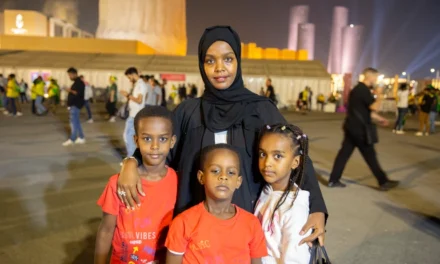A carbon footprint is a critical measure of responsibility to the planet. While environmental degradation affects everyone, the sources of the damage — and the ability to mitigate it — are far from evenly distributed. For Muslims living in North America, particularly in the United States and Canada, an urgent question arises: how do we reconcile our carbon-intensive lifestyles with Islam’s ethical demands? What does it mean to be God’s khalīfa (vicegerent) on Earth when our consumer choices contribute to global warming? What can Muslim North Americans do to prevent species extinction and the suffering of vulnerable populations across the globe?
Unequal Emissions, Unequal Responsibilities
Everyone across the globe must recognize there is deep inequality when it comes to carbon emissions and resource consumption between the Global North and the Global South. The average carbon footprint per capita in the U.S. is around 16 metric tons per year, one of the highest in the world. In contrast, per capita emissions in countries like Bangladesh, Sudan, or Yemen are typically under 1 metric ton per year. Canada is not far behind the U.S., with an average of 14 to 18 metric tons per person, depending on the province. These numbers reflect more than just industrial activity — they reveal the ecological costs of everyday life in high-income societies: large homes with high energy use, heavy reliance on cars, frequent air travel, diets rich in meats and processed food, and mountains of plastic and food waste.
In contrast, many Muslim-majority nations – such as Somalia, Afghanistan, and Yemen – have among the lowest per capita carbon emissions. Despite low emissions, they are among the most vulnerable to climate-induced disasters. This disparity raises a sobering question: are we, by our daily habits, complicit in environmental injustice? To ignore this question is to overlook a profound contradiction between Islamic ethics and contemporary Muslim practices.
Islam’s Ecological Ethos
At its core, Islam is eco-conscious. The Quran and Sunnah offer a comprehensive moral framework for caring for the environment, using resources responsibly, and preserving life in all its forms. The concept of khalīfa (Quran 2:30) is central: human beings are vicegerents of God on earth, entrusted with maintaining balance (mīzān, 55:7–9) and avoiding corruption and excess.
God warns in the Quran, “Do not corrupt the earth after it has been set right” (7:56) and continues, “Indeed, the wasteful are brothers of the devils, and the devil is most ungrateful to his Lord” (17:27).
These verses not only condemn environmental destruction but also classify wastefulness as a spiritual disease. They suggest that overconsumption is not a neutral act, but rather a moral failing and a sign of ingratitude. Yet today, Muslim communities in North America are tempted by consumerism. Whether it is extravagant wedding banquets, fast fashion purchases for Eid and other celebrations, regular overseas vacations, or energy-intensive homes, many have adopted lifestyles that mirror – and at times exceed – the mainstream capitalist culture’s excesses.
A Culture of Excess
The U.S. discards roughly 40% of its food supply each year which is about 60 million tons (“Fighting Food Waste,” Oct. 24, 2022, National Conference of State Legislatures). For its part, Canada throws out nearly $50 billion worth of food annually, about 60% of what it produces (“Circular Food Economy: Canada’s $50 Billion Opportunity,” June 27, 2024, Ivey Business School, London, Ont.). While there is no data on the contributions of Muslim households to food waste, it can be assumed that some contribute to these disturbing trends. Consider the vast quantities of food wasted during Ramadan or at weddings, celebrations, and religious gatherings. Further, within Islam, waste is not limited to food; it applies to anything we are blessed with such as finance, talent, time, and energy. Some affluent Muslim families own multiple cars, accumulate unnecessary fashion items , make regular long-distance trips, and/or purchase luxury goods. These practices have not only become normalized but celebrated as a sign of social status. This leads to some young Muslims falling into a crisis of wastage of their time, potential, and energy.
This culture of excess and waste contradicts the Prophet Muhammad’s (salla Allahu ‘alayhi wa sallam) lifestyle. We know that he lived simply, wore patched garments, slept on a mat of rushes, repaired his belongings, and ate with moderation. He instructed believers to conserve water even when performing ablution from a flowing river – a powerful metaphor for moderation in abundance. We are living in the 21st century and moderation in the Prophet’s time might not be equivalent to how contemporary society conceptualizes the notion. It is, however, not difficult to understand whether collectively we are emulating the Prophet’s prudent lifestyle or whether we are following the crowd by competing to spend, indulge, and impress.
Navigating Privilege and Responsibility
Muslims living in affluent countries – particularly in North America – are uniquely positioned and morally obliged to lead the way in environmental reform. They enjoy access to education, resources, and platforms that can amplify change. They should try to refrain from replicating the host culture’s patterns of consumption and wastefulness lest they become complicit in committing environmental injustice. A carbon-intensive lifestyle is not only detrimental to the earth and future generations, but it is also an act of betrayal against our fellow beings whose lives and livelihoods are being destroyed by climate-induced disasters.
This moral dissonance invites not just individual reflection but communal action. Mosques, community centers, and Islamic schools in the West must go beyond symbolic gestures like recycling bins and tree-planting drives. They should lead campaigns to divest from fossil fuels, educate congregants about ethical consumerism, and call for reforms and practices to uphold sustainability. But they must, first and foremost, walk the talk.
Embracing Minimalism: An Islamic Imperative
The antidote to environmental destruction is not merely technological innovation, it is spiritual and ethical renewal. The Prophet exemplified a modest and balanced lifestyle long before the term “minimalist” became fashionable. His teachings offer a blueprint for sustainable living rooted in contentment (qanāʿa), gratitude (shukr), and moderation (wasatiyya).
Minimalism in Islam is not about deprivation or romanticizing poverty; it is about intentional living. Every item we own and every action we take aligns with a higher purpose. The Quran does not praise those who live extravagantly but rather those who spend “neither extravagantly nor stingily, but [hold] a medium way between those [extremes]” (25:67).
This ethos must be revived in this age of rampant consumerism, often disguised as a sign of empowerment and freedom. Muslims must resist the temptation to define success by wealth and possessions, and instead return to Islamic values that emphasize simplicity, generosity, and restraint. Buying less, sharing more, repairing instead of replacing are not merely eco-friendly habits; when done with intention, they are acts of worship.
The Ummah is global, and so is the climate crisis. Think of the farmer in Sudan facing drought, the fisherman in Bangladesh watching the tides rise, and the Muslim American professional navigating ethical dilemmas in a consumer-driven society. While the climate crisis affects everyone, not all bear the same responsibility.
Islam calls for solidarity and justice, not only among humans but between humanity and the rest of creation. In the Quran, all creatures are “communities like you” (6:38). Trees, animals, rivers, and skies are not mere backdrops to human life, but they are signs of God deserving of respect and protection. To ignore the ecological dimension of our faith is to neglect a fundamental part of what it means to be a Muslim. Climate change is not just an environmental issue; it is a test of our ethics, our compassion, and our capacity for self-restraint.
Muslims must return to the Prophetic model of simplicity and prudence. They should teach their children that living well does not mean owning more but caring more – about people, animals, and the environment. Moreover, living well comes with sacrifice; people must bear with inconvenience in exchange for long-term, greater benefits. Indeed, it’s no fun to be constantly mindful of everything we purchase and dispose of, and it’s a hassle to commit to reducing, reusing, and recycling. But by embracing these occasionally inconvenient habits, we discipline our soul and perform acts of worship through setting the right intention.














